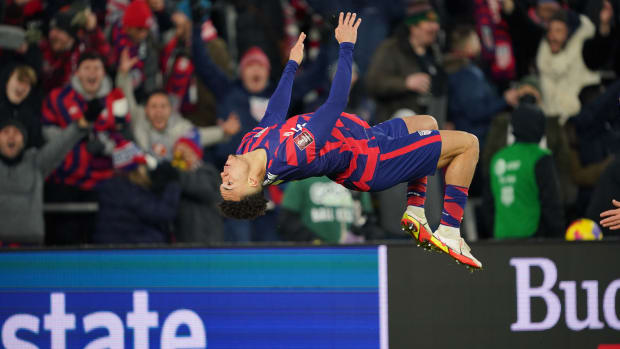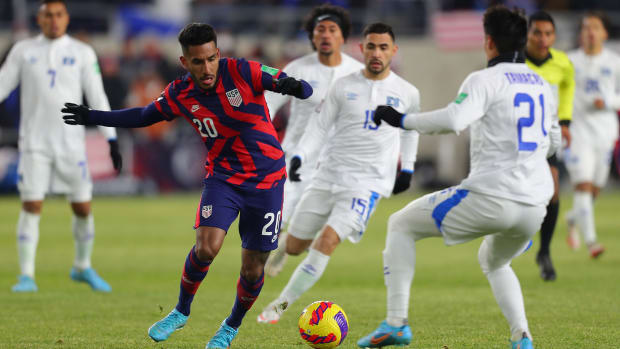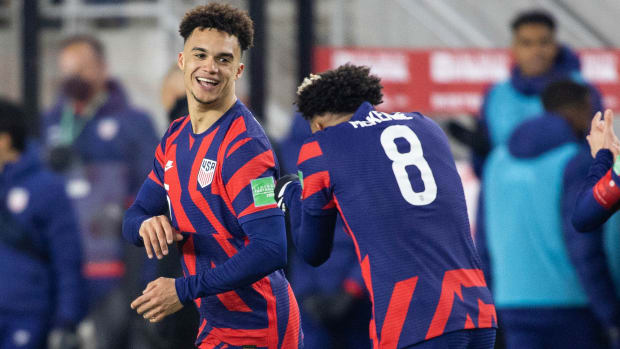COLUMBUS, Ohio — Like a car starting in the dead of winter, the U.S. men’s national team took a while to warm up on a crisp Columbus evening.
It wasn’t as frigid as many feared. Coach Gregg Berhalter even called the atmosphere “optimal.” But it was cold. Although afternoon snow flurries had subsided by the time Thursday’s World Cup qualifier against El Salvador kicked off at Lower.com Field, the wind chill was 25 degrees. Those aren’t ideal soccer conditions, but it’s what the Americans expected and embraced when selecting cold-weather venues for two home dates during this critical qualifying window. Sure, the hosts might be uncomfortable. The Central American visitors, hopefully, would be miserable.
The Salvadorans, several of whom were wearing leggings and long sleeves under their all-white uniforms, didn’t wilt. But they didn’t muster much of a threat either, and after failing to connect the dots during a frustrating first half, the favored U.S. finally found the goal it needed. Left back Antonee Robinson did the honors, lifting the Americans to a vital 1–0 victory that keeps them a single point off the top of Concacaf’s Octagonal standings. The win was a fair reflection of the home team’s clear superiority. And the close final score was a fair reflection of both its lack of precision in the attacking third and El Salvador’s refusal to yield.
“It was never going to be [that] we turn up with the short time we’ve had to prepare and just play an amazing game of football and win 6-0. It was always going to be a tough, tight affair. They made it difficult for us. They were aggressive. They sat tight,” said Robinson, the 24-year-old Fulham defender who finally broke through with the U.S. last year after making his debut in 2018. “We kept patient. We kept doing what was working and eventually got the goal, thankfully.”

John Todd/ISI Photos/Getty Images
Robinson’s 52nd-minute goal, his second of the qualifying campaign, could wind up being one of the biggest scored in Berhalter’s tenure. This was pretty much a must-win match. Qualifying points are almost always at a premium and the Octagonal is only going to get tougher as it hits the home stretch. The U.S. (5-1-3) now heads north for a visit to resurgent, first-place Canada (5-0-4) on Sunday, then flies to St. Paul, Minn. to entertain Honduras on Feb. 2 (the wind chill there was -1 at the conclusion of Thursday’s game).
The March window, which comprises the final three Octagonal contests, will be even tougher. It’ll be bookended by trips to Mexico and Costa Rica, where the U.S. has never won a qualifier. The Americans need to get to March with momentum, if not some sort of cushion (the top three finishers qualify directly for the World Cup while the fourth-place team, now four points behind the U.S., heads to a one-game playoff). So take those win-now stakes, add the weather, El Salvador’s frenetic pressure on the ball and a few unfortunate U.S. misplays, and you get a hard-fought, high-stress game that was a lot tighter than paper and pedigree might suggest.
“[These] are the games we have to keep winning if we want to qualify,” Robinson said.
Fueled by chicken broth and hot tea in ample supply, the U.S. found a bit of rhythm after a disjointed opening stretch and repeatedly pinned El Salvador back with forays by Tim Weah and Sergiño Dest down the right. Weston McKennie was the attacking fulcrum in midfield and striker Jesús Ferreira, a somewhat surprising starter over autumn revelation Ricardo Pepi, was active and available as a target. Ferreira could’ve put the Americans ahead on two occasions during the opening half, but wound up sending a pair of close-range shots over the crossbar.

Omar Vega/Getty Images
“I wouldn’t say this was our best game. We didn’t finish enough of our chances that we had [and] I didn’t think our press was connected as it needed to be,” Berhalter acknowledged. “We had enough chances in the first half to score goals. So that’s what I’m happy with. I think we could’ve finished off some chances.”
The manager added, “You also have to give El Salvador credit because those guys fought.”
The Salvadorans did a decent job neutralizing Christian Pulisic, who played a little more than hour. But the width of the U.S. attack eventually did the visitors in. Dest’s creativity and knack for finding space to cross, Weah’s ability to stretch the back line and, finally, Robinson’s full-field acumen, composure and timing made the difference.
“We call our fullbacks our super power of our team. We do that because they produce. They give assists and goals. If you look at World Cup qualifying so far, our fullbacks have contributed heavily,” Berhalter said, rattling off the goals and assists contributed by Dest, Robinson and DeAndre Yedlin. It was Dest who scored the stunning equalizer in October’s 2–1 defeat of Costa Rica here in Columbus. And it was Robinson’s turn on Thursday.
As he was much for the evening, McKennie was the catalyst on the play that decided the game. His long ball from the right fell to Weah, who evaded two Salvadoran defenders and took a shot that goalkeeper Mario González parried away. While Ferreira’s finishing may have been failing him, his influence as an attacking conduit was evident. The FC Dallas forward resisted the temptation to head the rebound back toward goal and, instead, sent it smartly to the left. The ball bounced to Robinson, who hammered an eight-yard shot back to the right.

Trevor Ruszkowski/USA TODAY Sports
“I was told be positive, try and get in the box, try and threaten in behind, make runs in behind. So I just kept trying to find myself in good positions, especially when Sergiño was higher or was out in a wide right position—get on the back post and get in the box for crosses. It was very similar to my goal against Honduras,” Robinson explained.
“It sort of came across the box. It’s not been picked up well by the defenders. They’ve sort of not read the deflections and headers and stuff, and so it was just down to being lucky to have put myself in a good position,” he continued. “I just tried to keep my head down and put the ball far corner and thankfully it went in. I was over the moon. It’s an unreal feeling. It’s the best feeling in football to score goals.”
Robinson’s back-flip celebration, which ended with a feigned muscle pull, was spectacular.
“That’s an amazing physical feat,” Berhalter said.
"That celebration always hypes us up,” Weah added. “He’s a huge part of the team. We love him and cherish him, and I'm glad he's getting the glory tonight."
Yunus Musah came close to doubling the U.S. lead a few minutes later, and Robinson nearly added a second in the 65th. But González was up to the challenge on both occasions, leading the Americans and goalkeeper Matt Turner to sweat out the shutout and a narrow win.
It was a result that was both difficult to secure and deserved, and it served as yet another reminder that there are no style points in Concacaf. The U.S. often relies on its fullbacks, and one of them delivered again in Columbus. The defense was solid—Seattle Sounders midfielder Alex Roldan had the only real Salvadoran chance—and the American midfield demonstrated an ability to adjust, stay patient and find ways to use the field. Ferreira could’ve put the game out of reach earlier, but for a player starting his first qualifier, there was an admirable amount of confidence, focus and ingenuity. And so it’s on to Canada.
“We’re definitely one step closer,” Robinson said. “We’re really happy to get the win. This is what we’ve been preparing for. It wasn’t the prettiest game. There were times we played good football, times we just had to kind of dig it out—chances that we didn’t put away. But we got the win. We’re one step closer to our goal of qualifying for the World Cup.”







